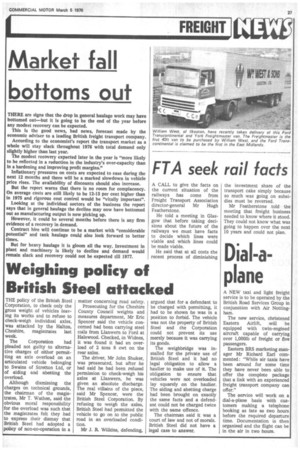Weighing policy of British Steel attacked
Page 29

If you've noticed an error in this article please click here to report it so we can fix it.
THE policy of the British Steel Corporation, to check only the gross weight of vehicles leaving its works and to refuse to check-weigh individual axles, was attacked by the Halton, Cheshire, magistrates last week.
The Corporation had pleaded not guilty to alternative charges of either permitting an axle overload on an articulated vehicle belonging to Swains of Stretton Ltd, or of aiding and abetting the overload.
Although dismissing the charges on technical grounds, the chairman of the magistrates, Mr T. Wathen, said the obvious moral responsibility for the overload was such that the magistrates felt they had to :express their dismay that British Steel had adopted a policy of non-co-operation in a matter concerning road safety.
Prosecuting for the Cheshire County Council weights and measures department, Mr Eric Spencer said •the vehicle concerned had been carrying steel coils from Llanwern to Ford at Halewood. Checked, in Widnes, it was found it had an overload a 2 tons 8 owt on the rear axles.
The driver, Mr John Shuker, was prosecuted, but after he had said he had been refused permission to check-weigh his axles at Llanwern, he was given an absolute discharge. The real villains of the piece, said Mr Spencer, were the British Steel Corporation. By refusing to weigh the axles, British Steel had permitted the vehicle to go on to the public road :in 'an overloaded condition.
Mr J. R. Wilkins, defending, argued that for a defendant to be charged with permitting, it had Ito be shown he was in a position to forbid. The vehicle was not the property of British Steel and the Corporation could not prevent its use merely because it was carrying its goods.
The weighbridge was installed for the private use of British Steel and it had no legal obligation to allow a haulier to make use of it. The obligation to ensure that vehicles were not overloaded lay 'squarely on the haulier. The aiding and abetting charge had been brought on exactly the same facts and a defendant could not be charged twice with the same offence.
The chairman said it was a court of law and not of morals. British Steel did not have a legal case to answer.




















































































































































